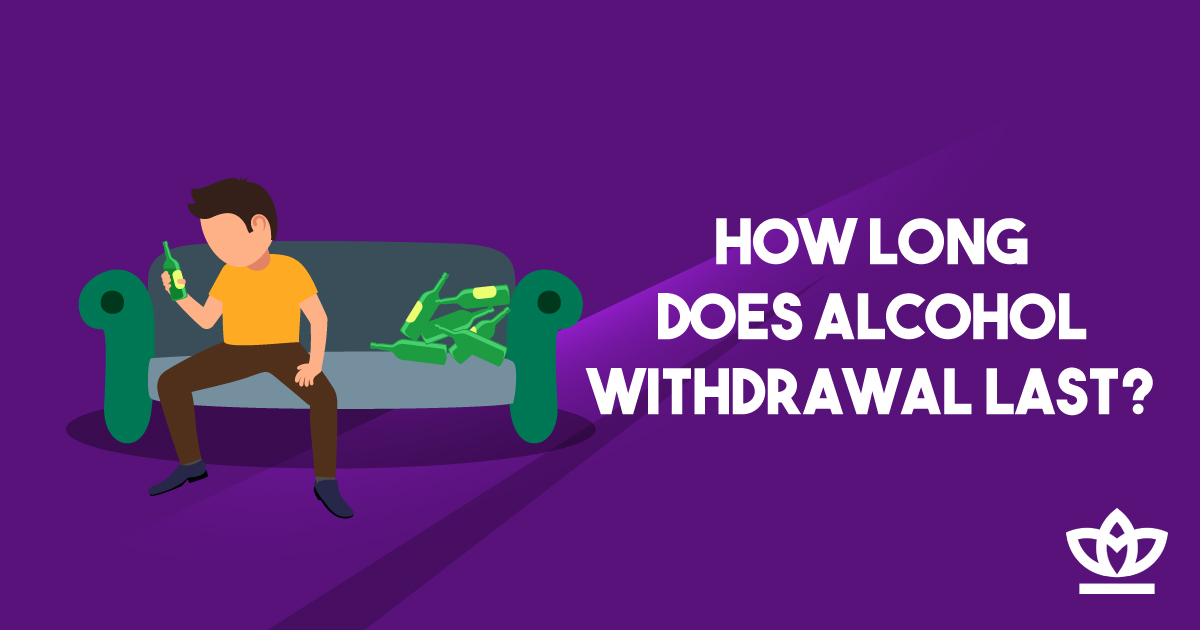How Long Does Alcohol Withdrawal Last?

Alcohol is one of the most commonly abused substances in the world. Unlike many other addictive drugs, alcohol is legal and readily available.
It is estimated that every year, almost 3 million people die worldwide from alcohol-related problems.
If you drink alcohol regularly, you will likely develop a dependence on alcohol. After that, if you try to discontinue alcohol abruptly, you will experience a range of physical and psychological symptoms known as Alcohol Withdrawal Syndrome.
Signs of alcohol withdrawal start to show between 6–8 hours after your last drink.
Usually, these symptoms start to intensify after 1 to 3 days after the first appearance of symptoms and can last for 5 to 7 days, for some cases, weeks. These symptoms include trembling, vomiting, headache, and an intense urge to drink alcohol (craving).
Alcohol withdrawal symptoms typically follow a general timeline.
Timeline and Stages of Alcohol Withdrawal Syndrome
The timeline for alcohol withdrawal is different for different people. Also, the symptoms vary per person, where some may experience only mild withdrawal while others may experience severe withdrawal.
But generally, we can divide alcohol withdrawal symptoms into three stages.
You may like to read: A Comprehensive Guide on Drug Withdrawal Symptoms
Stage 1: Mild Alcohol Withdrawal Symptoms
Four to six hours: Tremors or “alcohol shakes” start to begin within 4 to 6 hours.
Six to ten hours: After about 6 hours, mild withdrawal sets in, and you start to experience a range of different symptoms. These symptoms can last for 1 to 2 days, for some people, maybe several days. Sometimes people overlook these symptoms because they are similar to hangover symptoms.
Mild Symptoms
- Headache
- Diarrhea
- Excessive sweating
- Shakes
- Anxiety
- Depression
- Insomnia
- Fatigue
- Nausea
- Vomiting
- Loss of appetite
- Unclear thoughts
- Mood Swings
Stage 2: Moderate Alcohol Withdrawal Symptoms
Between 12–48 hours after the last drink, moderate symptoms may start to develop. These symptoms are more severe than mild symptoms and often need medical attention.
Moderate Symptoms
- Sweating
- Trembling
- Low-grade fever
- Vomiting
- Diarrhea
- Rapid breathing
- Agitation
Stage 3: Severe Alcohol Withdrawal Symptoms
Twenty-four to forty-eight hours: Within 24 to 48 hours, alcoholic hallucinosis can begin, though these symptoms are rare. For limited cases, alcohol hallucinations can stay for several days, even for a month too. Alcoholic hallucination includes the following:
- Auditory hallucinations: Hearing things
- Tactile hallucination: Itchy feeling on the skin without any reasons
- Visual hallucination: Seeing things that are not there
Six to forty-eight hours: Seizures may begin early but can intensify within 24 to 48 hours. They typically slow down within 3 days of quitting alcohol.
Characteristics of Seizure
- Tonic-Clonic Seizure
- Short but frequent seizures (May have up to 6 seizures in 6 hours)
Forty-eight to seventy-two hours: Severe confusion is the hallmark sign of delirium tremens, which is life-threatening and requires medical attention.. Delirium tremens typically starts to show within 48 to 72 hours of the last drink, but can be delayed. Symptoms last for about 2 to 3 days, possibly as long as a week.
Delirium Tremens Symptoms
- Delirium (confusion)
- Agitation
- Tremors
- Fear
- Hallucinations
- Fever
- Sweating
- High blood pressure
- Increased heart rate
- Dehydration
- Excessive burst of energy
- Mood swings
Four to six weeks: After 4 to 6 weeks, some people can experience Protracted Alcohol Withdrawal Syndrome or PAWS.
Symptoms of PAWS
- Anxiety
- Cravings
- Loss of sex drive
- Fatigue
- Insomnia
- Depression
- Lack of concentration
- Hostility
These symptoms are not typical for everyone, while some people may suffer from all of them.
For some people, PAWS symptoms improve after a few days; for others, it gets worse and can cause life-threatening complications.
Factors That Affect Alcohol Withdrawal Timeline
Several factors affect the timeline and duration of alcohol withdrawal symptoms.
One factor is how abruptly one stops drinking. When you stop using alcohol suddenly, withdrawal effects will start to show within a couple of hours and may stay for a longer time.
But if you cut down your alcohol intake slowly, you may not experience severe withdrawal syndrome. However, before implementing this method, please consult with a medical supervisor.
Apart from that, there are some other factors which affect the timeline:
- Poor diet
- Unhealthy lifestyle
- Mental disorder
- Immune system dysfunction
Remember that, no matter how long you have been drinking, recovery is possible. Alcohol withdrawal is scary, but if you can go through the withdrawal process with the help of medical professionals, they can ensure you have a smoother withdrawal process.
After the withdrawal is over, you’ll want to attend a treatment program or support group regularly to work on the reasons that led you to problem drinking. A beautiful addiction-free life that you can enjoy to the fullest is possible.













